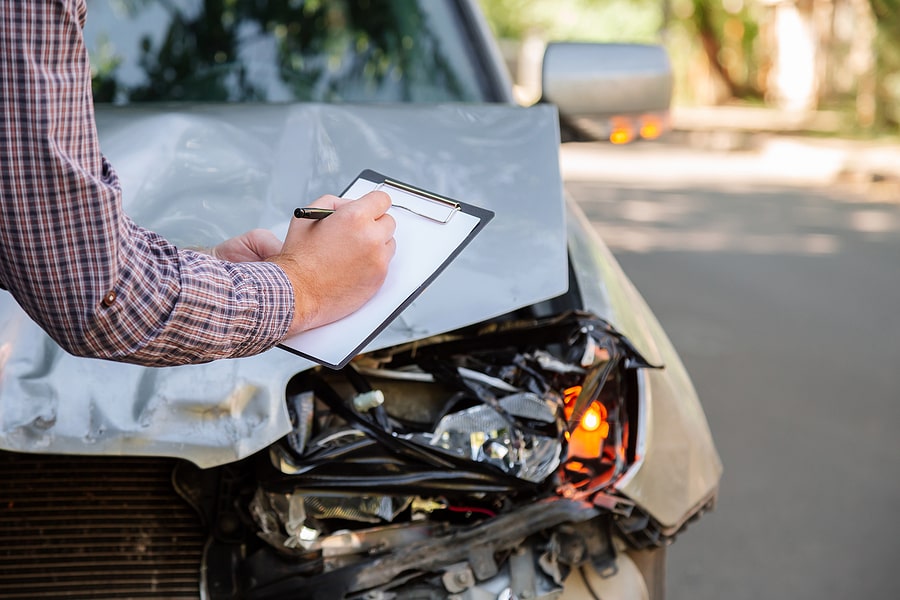Another driver caused your car accident due to negligent behavior. You know that you have grounds to file a claim against the liable driver’s insurance. However, figuring out what to accept as part of a car accident insurance claim settlement, including what you should expect through the claim process, can leave many accident victims confused.
What does a car accident insurance claim settlement look like?
The Insurance Company’s Initial Offer
Immediately after a car accident, you may receive a settlement offer from the car insurance company. That initial offer may seem tempting. The insurance company may even pressure you highly to accept that offer. If you accept, the insurance company might point out, you will have the funds you need on hand to take care of your vehicle repairs and manage your immediate medical costs. You will even have ready cash in hand that can make up for missing work while recovering from your injuries.
Further examination of that offer, however, may show that you have not received an offer that reflects the compensation you deserve for your injuries. You may not even know what your financial costs—or, for that matter, your long-term physical costs—will look like until months after the accident. Not only can accepting that settlement offer prove premature, you may not even realize the full extent of your losses until much later.
Keep in mind that many car insurance companies will try to push an initial settlement offer that simply does not reflect the real compensation you deserve. You have the right to negotiate and even fight for the compensation you really deserve for your injuries. Always consult an attorney before moving forward with a settlement, since an attorney can help break down the financial impact of your accident. And remember: once you accept a settlement offer you may no longer seek to receive additional funds in the future.
What Does a Car Accident Insurance Claim Settlement Include?
Often, you may need to work with an attorney to break down the compensation you may deserve through a car accident insurance claim. An attorney cannot guarantee what you will recover but can help break down your financial losses and give you a better idea of how much compensation you should demand.
Compensation for Damages to Your Vehicle
Most of the time, damages to your vehicle and damages to your body fall under separate categories in a car insurance policy. To receive compensation for the damages to your vehicle, you will need to schedule an evaluation for your vehicle with a certified technician, or from the insurance adjuster directly, depending on the insurance company’s policies.
Never take your car in for repairs before talking to the insurance company, since if the insurance company cannot evaluate the damage, it may deny compensation for those repairs.
If you cannot get your vehicle repaired due to the extent of the damage, or the cost of repairs to your vehicle exceeds its value, the insurance company may total your vehicle. After totaling your vehicle, the insurance company will provide the value of the vehicle in compensation. Sometimes, you may have the right to contest the vehicle’s value or the cost of repairs based on independent estimates, so you may want to consult with a lawyer before accepting compensation for the damages to your vehicle.
Compensation for the Medical Costs You Faced After Your Accident
After a serious accident, medical bills can pose a serious challenge. You may find yourself facing the cost of emergency medical treatment as well as the cost of ongoing treatment related to your accident.
Nevada does not require drivers to carry personal injury protection insurance or MedPay insurance, which covers the cost of medical bills following a car accident regardless of who caused the accident.
However, it is recommended to carry personal injury protection insurance, which may alleviate some of your financial worries if you suffer injuries in a car accident.
If you do carry PIP insurance, you will use it to cover your medical expenses first. Once you have exhausted the coverage offered by PIP protection, you can pursue compensation through the other driver’s insurance company. Since the cost of treating many types of injuries may considerably exceed the value of many bodily injury protection policies, you may need to use both types of coverage for your injuries.
Talk to your lawyer about what costs you can include as part of your injury claim following a car accident.
Emergency Medical Costs
Emergency medical costs may start mounting as you leave the scene of the accident in an ambulance. Ambulance transport often proves more expensive than people expect, since ambulances can run up to $1,200 plus mileage for a single trip. Then, you will need to go for an emergency evaluation and treatment at a local hospital or urgent care center. In some cases, you may need emergency surgery to help treat car accident injuries. In others, your emergency room experience may begin a much longer stay in the hospital.
Tests and Procedures
You may need multiple tests and procedures to diagnose your injuries after an accident—and even tests performed in the emergency room may arrive as a separate bill. If you have serious injuries, your doctors may also want to monitor your recovery closely over time, from keeping an eye on how a broken bone heals to monitoring the progression of traumatic brain injury recovery.
You may also need to go through multiple treatments to help increase your recovery and treat your injuries properly.
Surgeries
Many types of injuries may require surgery to increase your odds of recovery as much as possible. When you go in for surgery, expect to receive more than one medical bill for the procedure. You may have bills from the anesthesiologist and the doctor who performed the procedure and bills from the hospital itself. Keep up with all those medical bills so you can turn them over to your lawyer as you work to form your car accident insurance claim.
Long-Term Care
Some types of injuries may require you to have assistance with your long-term needs. You may, for example, need to spend time in a long-term care facility, or you may need in-home care to make it easier for you to get around and take care of yourself after the accident. Long-term care costs can prove astronomical over time.
Durable Medical Equipment
In the case of some types of injuries, you may need durable medical equipment to help increase your mobility or make it easier for you to take care of tasks independently. Durable medical equipment could include wheelchairs, prosthetic devices, or devices to aid in your overall independence and recovery.
Therapy
Following your accident, you will likely need several types of therapy to help you make a full recovery. You may go through physical therapy to help you rebuild strength after your accident or maintain strength when you need time off your feet to recover from your injuries. If you have severe injuries that will pose permanent limitations, you may go through occupational therapy to learn how to cope with them, from how to get around in a wheelchair to how to adapt to a traumatic brain injury. You may also go through psychological therapy to help you deal with the trauma the accident caused.
Compensation for the Wages You Lost Because of Your Accident
Severe injuries may mean a considerable amount of time away from work after your accident, often at what feels like the worst time possible. Just as you have more bills than usual coming in, you may have to miss many hours at work.
Not only can your injuries prevent you from working in the early days of your recovery, since you may have limitations that make it difficult for you to take on your usual tasks at work, you may miss work long-term after the accident as you manage your recovery. For example, even if you have gone back to work after the accident, you may miss time for follow-up procedures or surgeries. If you have to have physical or occupational therapy, those appointments could interfere with your ability to maintain your usual work schedule.
Furthermore, you may end up using your paid time off, either in the form of sick leave or in the form of vacation time, to help compensate for your missed time at work. Talk to your attorney about how to include those losses as part of your car accident insurance claim.
Compensation for Your Pain and Suffering
Most of the areas of compensation in your car accident insurance claim relate to your direct financial losses from the accident. Your losses, however, may not include financial challenges alone. Due to your accident, you may suffer limitations in your personal life, from your ability to enjoy your usual hobbies and activities to your ability to interact normally with friends and family members. Not only that, you may suffer immense physical pain or emotional anguish related to your injuries.
Compensation for pain and suffering can prove more difficult to calculate than compensation for the financial losses you faced after your accident since you do not have numbers to measure your pain and suffering. However, a lawyer can help break down the compensation you may deserve for your injuries, from the compensation that comes directly from your financial losses to the compensation related to pain and suffering.
Talk to your lawyer about the losses that do not have direct financial value, including the potential loss of enjoyment of life, emotional anguish because of the activities you can no longer engage in, or lost relationships because you cannot participate in activities with friends and family members the way you did before your accident. Make sure you offer an accurate picture of how your injuries have impacted your life so that your lawyer can help break down the full compensation you should expect, or at least ask for, as you move forward with your claim
The Limitations of Auto Insurance Policies
Car insurance policies provide much-needed financial compensation for the victim of a car accident. An accident can occur in the blink of an eye, leaving substantial physical damage both to vehicles themselves and to any passengers in those vehicles. Those policies, however, may have substantial limits.
Nevada minimum auto insurance, for example, provides $25,000 in compensation to one individual for injuries sustained in an accident. If multiple parties suffer injuries in the same accident, Nevada minimum auto insurance offers $50,000 in compensation for the entire accident. That can mean substantial limitations on the compensation you can recover, even if you have severe injuries and immense medical bills associated with the accident.
Some auto insurance policies, however, may offer more compensation than others. Uber and Lyft, for example, offer much more substantial insurance policies to protect their drivers. Big truck drivers usually carry much more comprehensive commercial insurance policies. Commercial drivers, including delivery drivers, may have higher-value policies offered by their companies. Furthermore, some drivers may deliberately choose higher-payment policies that will provide additional compensation to them or any victims of an accident caused by their negligence.
Always have an attorney look over the insurance policy that covers the liable driver after a serious accident. Frequently, an attorney can uncover additional compensation that you may deserve, based on the policy’s terms. An attorney may also help you better understand the policy’s limitations and how it may affect your right to compensation.
If you suffered serious injuries in an auto accident, do not try to handle your own claim. Working with a car accident attorney can provide you with a much closer look at the compensation you really deserve and how to manage the aftermath of a claim.
By: Ben Bingham


